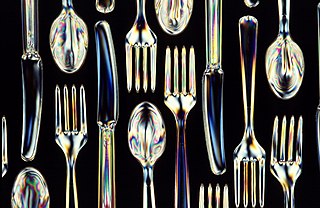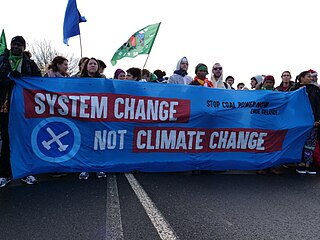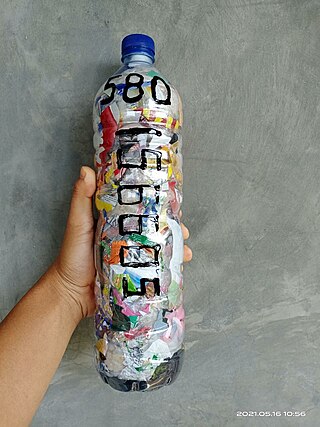Related Research Articles

A fossil fuel is a carbon compound- or hydrocarbon-containing material formed naturally in the Earth's crust from the buried remains of prehistoric organisms, a process that occurs within geological formations. Reservoirs of such compound mixtures, such as coal, petroleum and natural gas, can be extracted and burnt as a fuel for human consumption to provide energy for direct use, to power heat engines that can propel vehicles, or to generate electricity via steam turbine generators. Some fossil fuels are further refined into derivatives such as kerosene, gasoline and diesel, or converted into petrochemicals such as polyolefins (plastics), aromatics and synthetic resins.

Plastic recycling is the processing of plastic waste into other products. Recycling can reduce dependence on landfill, conserve resources and protect the environment from plastic pollution and greenhouse gas emissions. Recycling rates lag behind those of other recoverable materials, such as aluminium, glass and paper. From the start of plastic production through to 2015, the world produced around 6.3 billion tonnes of plastic waste, only 9% of which has been recycled and only ~1% has been recycled more than once. Of the remaining waste, 12% was incinerated and 79% was either sent to landfills or lost to the environment as pollution.

Bioplastics are plastic materials produced from renewable biomass sources. Historically, bioplastics made from natural materials like shellac or cellulose had been the first plastics. Since the end of the 19th century they have been increasingly superseded by fossil-fuel plastics derived from petroleum or natural gas. Today, in the context of bioeconomy and circular economy, bioplastics are gaining interest again. Conventional petro-based polymers are increasingly blended with bioplastics to manufacture "bio-attributed" or "mass-balanced" plastic products - so the difference between bio- and other plastics might be difficult to define.

Biodegradable plastics are plastics that can be decomposed by the action of living organisms, usually microbes, into water, carbon dioxide, and biomass. Biodegradable plastics are commonly produced with renewable raw materials, micro-organisms, petrochemicals, or combinations of all three.

Greenhouse gas (GHG) emissions from human activities intensify the greenhouse effect. This contributes to climate change. Carbon dioxide, from burning fossil fuels such as coal, oil, and natural gas, is one of the most important factors in causing climate change. The largest emitters are China followed by the United States. The United States has higher emissions per capita. The main producers fueling the emissions globally are large oil and gas companies. Emissions from human activities have increased atmospheric carbon dioxide by about 50% over pre-industrial levels. The growing levels of emissions have varied, but have been consistent among all greenhouse gases. Emissions in the 2010s averaged 56 billion tons a year, higher than any decade before. Total cumulative emissions from 1870 to 2022 were 703 GtC, of which 484±20 GtC from fossil fuels and industry, and 219±60 GtC from land use change. Land-use change, such as deforestation, caused about 31% of cumulative emissions over 1870–2022, coal 32%, oil 24%, and gas 10%.

The fossil fuels lobby includes paid representatives of corporations involved in the fossil fuel industry, as well as related industries like chemicals, plastics, aviation and other transportation. Because of their wealth and the importance of energy, transport and chemical industries to local, national and international economies, these lobbies have the capacity and money to attempt to have outsized influence on governmental policy. In particular, the lobbies have been known to obstruct policy related to environmental protection, environmental health and climate action.

Fossil fuel phase-out is the gradual reduction of the use and production of fossil fuels to zero, to reduce deaths and illness from air pollution, limit climate change, and strengthen energy independence. It is part of the ongoing renewable energy transition, but is being hindered by fossil fuel subsidies.
Philippe Le Billon is a researcher known for his work in political ecology and on the political economy of war. A Fulbright Research Chair at UC Berkeley and Scholar at the Institute for Advanced Study in Princeton, Le Billon is a professor at the University of British Columbia (UBC) with the Department of Geography and the School of Public Policy and Global Affairs. He earned an MBA at the Pantheon-Sorbonne University in Paris and a doctorate at the University of Oxford. Prior to joining UBC he collaborated with the International Institute for Strategic Studies (IISS) and the Overseas Development Institute (ODI).
Greenpeace USA is the United States affiliate of Greenpeace International, an environmental nonprofit organization that spawned a social movement inspired by direct actions on the high seas to stop whaling and nuclear testing. Headquartered in Washington D.C., Greenpeace U.S.A. operates with an annual budget of approximately $40 million, employing over 500 people in 2020. The organization relies on donations from members, refuses corporate contributions and refrains from endorsing political candidates, though in 2020 Greenpeace USA issued climate scorecards for presidential candidates and ranked them from best to worst on climate

Plastics are a wide range of synthetic or semi-synthetic materials that use polymers as a main ingredient. Their plasticity makes it possible for plastics to be molded, extruded or pressed into solid objects of various shapes. This adaptability, plus a wide range of other properties, such as being lightweight, durable, flexible, and inexpensive to produce, has led to their widespread use. Plastics typically are made through human industrial systems. Most modern plastics are derived from fossil fuel-based chemicals like natural gas or petroleum; however, recent industrial methods use variants made from renewable materials, such as corn or cotton derivatives.
Recycling can be carried out on various raw materials. Recycling is an important part of creating more sustainable economies, reducing the cost and environmental impact of raw materials. Not all materials are easily recycled, and processing recyclable into the correct waste stream requires considerable energy. Some particular manufactured goods are not easily separated, unless specially process therefore have unique product-based recycling processes.

Individual action on climate change describes the personal choices that everyone can make to reduce the greenhouse gas emissions of their lifestyles and catalyze climate action. These actions can focus directly on how choices create emissions, such as reducing consumption of meat or flying, or can be more focus on inviting political action on climate or creating greater awareness how society can become more green.

An ecobrick is a plastic bottle densely packed with used plastic to create a reusable building block that achieves plastic sequestration.The concept behind ecobricks is to utilize and upcycle post consumer plastic, benefiting our Earth. These plastic bottles are precisely packed with clean and dry used plastic to avoid the growth of bacteria. Ecobricks can be used to produce various items, including furniture, garden walls and other structures. These plastic packed bottles are produced primarily as a means of managing consumed plastic by sequestering it and containing it safely, by terminally reducing the net surface area of the packed plastic to effectively secure the plastic from degrading into toxins and microplastics. Ecobricking is a both an individual and collaborative endeavor. The ecobricking movement promotes the personal ecobricking process as a strategy to raise awareness of the consequences of consumption and the dangers of plastic. It also promotes the collaborative process as a way to encourage communities to take collective responsibility for their used plastic and to use it to produce a useful product.

Plastic pollution is the accumulation of plastic objects and particles in the Earth's environment that adversely affects humans, wildlife and their habitat. Plastics that act as pollutants are categorized by size into micro-, meso-, or macro debris. Plastics are inexpensive and durable, making them very adaptable for different uses; as a result, manufacturers choose to use plastic over other materials. However, the chemical structure of most plastics renders them resistant to many natural processes of degradation and as a result they are slow to degrade. Together, these two factors allow large volumes of plastic to enter the environment as mismanaged waste which persists in the ecosystem and travels throughout food webs.

The climate movement is a global social movement focused on pressuring governments and industry to take action addressing the causes and impacts of climate change. Environmental non-profit organizations have engaged in significant climate activism since the late 1980s and early 1990s, as they sought to influence the United Nations Framework Convention on Climate Change (UNFCCC). Climate activism has become increasingly prominent over time, gaining significant momentum during the 2009 Copenhagen Summit and particularly following the signing of the Paris Agreement in 2016.
China's waste import ban, instated at the end of 2017, prevented foreign inflows of waste products. Starting in early 2018, the government of China, under Operation National Sword, banned the import of several types of waste, including plastics with a contamination level of above 0.05 percent. The ban has greatly affected recycling industries worldwide, as China had been the world's largest importer of waste plastics and processed hard-to-recycle plastics for other countries, especially in the West.
Marinel Sumook Ubaldo is a Filipina climate activist from the Philippines who helped to organise the first youth climate strike in her country. She testified as a community witness for the Philippines Commission on Human Rights as part of their investigation into corporate responsibility and whether the effects of climate change can be considered violations of Filipinos’ human rights.

Plastic sequestration is a means of plastic waste management that secures used plastic out of industry and out of the environment into reusable building blocks made by manual compaction. Plastic sequestration is motivated by environmental protection and modeled on the Earth's process of carbon sequestration. Emerging out of the struggle of towns and communities in the Global South to deal with plastic pollution, plastic sequestration compaction methods are characterized by being locally based, non-capital, non-industrial and low-tech. Plastic sequestration is defined by the goals of securing plastic out of the environment and out of high energy/carbon industrial systems. Based on eliminating the chemical and physical and abiotic and biotic degradation pathways, plastic sequestration aims to achieve these goals, by terminally reducing the net surface area of thin film plastics. The building blocks that emerge from plastic sequestration are used in applications that further protect from degradation and permanently keep plastic out of industrial processes, thereby preventing their carbon emissions.

Jenna Jambeck an American environmental engineer who is the Georgia Athletic Association Distinguished Professor of Environmental Engineering at the University of Georgia. Her research considers plastic pollution and efforts to address plastic waste. In 2022, she was awarded a MacArthur Fellowship.
References
- ↑ Amos, Jonathan (2020-05-01). "High plastic concentration found on ocean floor". BBC News. Retrieved 2020-05-01.
- ↑ "Bren School - Faculty - Roland Geyer". www.bren.ucsb.edu. Retrieved 2020-05-01.
- ↑ Geyer, Roland; Jambeck, Jenna R.; Law, Kara Lavender (2017-07-01). "Production, use, and fate of all plastics ever made". Science Advances. 3 (7): e1700782. Bibcode:2017SciA....3E0782G. doi: 10.1126/sciadv.1700782 . ISSN 2375-2548. PMC 5517107 . PMID 28776036.
- ↑ Geyer, Roland (9 March 2021). "It's unavoidable: we must ban fossil fuels to save our planet. Here's how we do it". The Guardian. London, United Kingdom. ISSN 0261-3077 . Retrieved 2021-03-10.